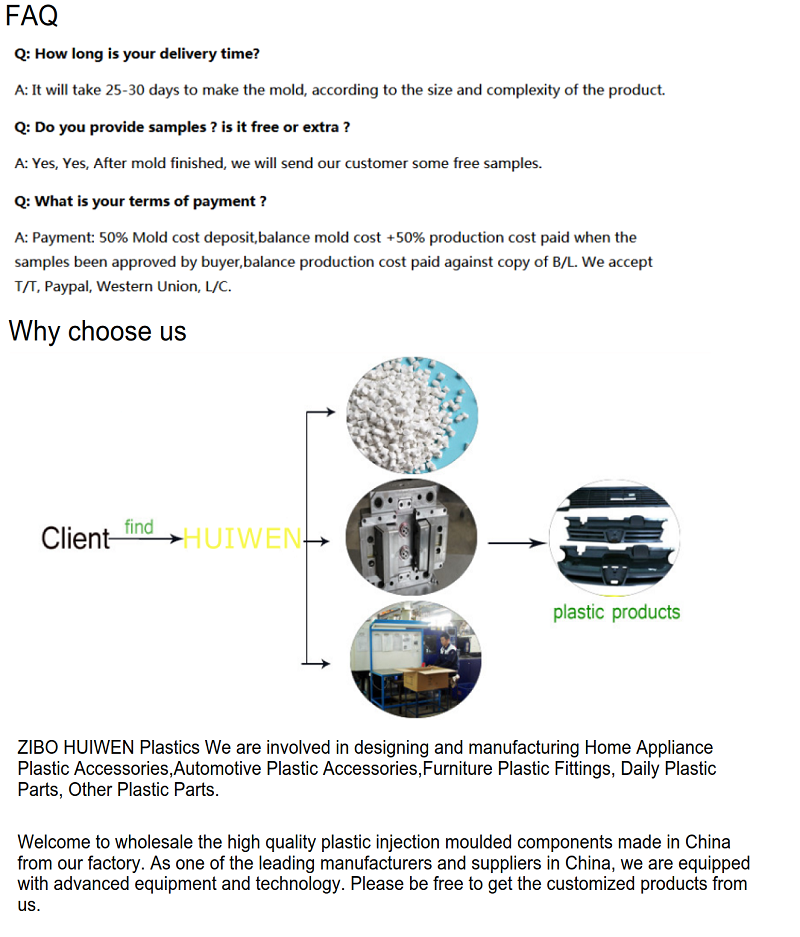Custom plastic Products Plastic Molding Products Parts are essential elements in appliance production that offer strength, precision, and versatility. These plastic home appliance components are designed to meet the specific demands of various home appliances for seamless integration and longevity. From kitchen appliances to cleaning equipment and electronic appliances, these precise plastic components for appliances play an essential role in enhancing functionality and customer satisfaction.
The term customized plastic products refers to flexibility and premium design. Each product is developed using sophisticated molding processes, which support intricate design and consistent quality. The plastic molding products for domestic use are produced in an assortment of materials like polypropylene, polycarbonate, and acrylonitrile butadiene styrene (ABS), each chosen depending on the needs of application. This guarantees that the final product is not just operational but also safe and environmentally friendly.
Key features of such plastics for home appliances include excellent heat, impact, and chemical resistances so that they can be employed both indoors and outdoors. They are lightweight and hence easy to handle and install, with smooth surface finishing enabling better appearance. They are also manufactured with tight tolerances so that they fit accurately and function in complex assembly processes. The ability to be custom-made in color, texture, and dimensions further enhances their application in industry and consumer demands.
The above-mentioned specification of custom plastic products points towards their importance in modern appliance design. From small interior pieces to massive structural pieces, they are the cornerstone of all house appliances. The domestic-use plastic molding items are typically used in washing machines, refrigerators, air conditioners, and microwaves where performance and dependability are the priority. The parts are made for long-term use and exposure to changing environmental situations and therefore ensure longer life with minimal upkeep. Moreover, the use of recyclable or environmentally friendly materials in certain models is also supportive of building consumer interest in eco-friendly options without any compromise on quality or performance.
These plastic parts in home appliances find themselves into various application environments. They are utilized in vacuum cleaners, blenders, coffee makers, and dishwashers, among others, to address the needs of efficiency and utility to the consumer. Additionally, they are utilized in intelligent home appliances, such as intelligent lighting systems and electronic thermostats, where precision and timing are crucial. The utility of these accurate plastic parts for appliances makes them a suitable choice as an option of choice for producers seeking to enhance product performance without increasing costs or facing scalability limitations.
Testimonials from consumers globally indicate satisfaction with the quality and performance of the custom plastic products. Many users appreciate the durability and simplicity of integration into existing systems, reducing replacement needs. Others highlight the concern and attention to detail involved in the manufacturing process, resulting in a clean and professional finish. Good feedback also highlights the longevity of the products under different operating conditions, vouching for their value as critical parts in today's home appliances.
Some frequent inquiries about these plastic parts for home appliances are generally in the areas of material selection, whether the product can be customized, and whether it is compatible with different appliances. There are questions regarding high-temperature tolerance materials, others regarding producing some special shapes and sizes to fulfill some design requirements, and other questions regarding production timelines, minimum order quantities, and quality inspection procedures. Manufacturers typically provide detailed information on all these aspects so customers can make informed decisions and obtain the optimum from their chosen plastic components.










